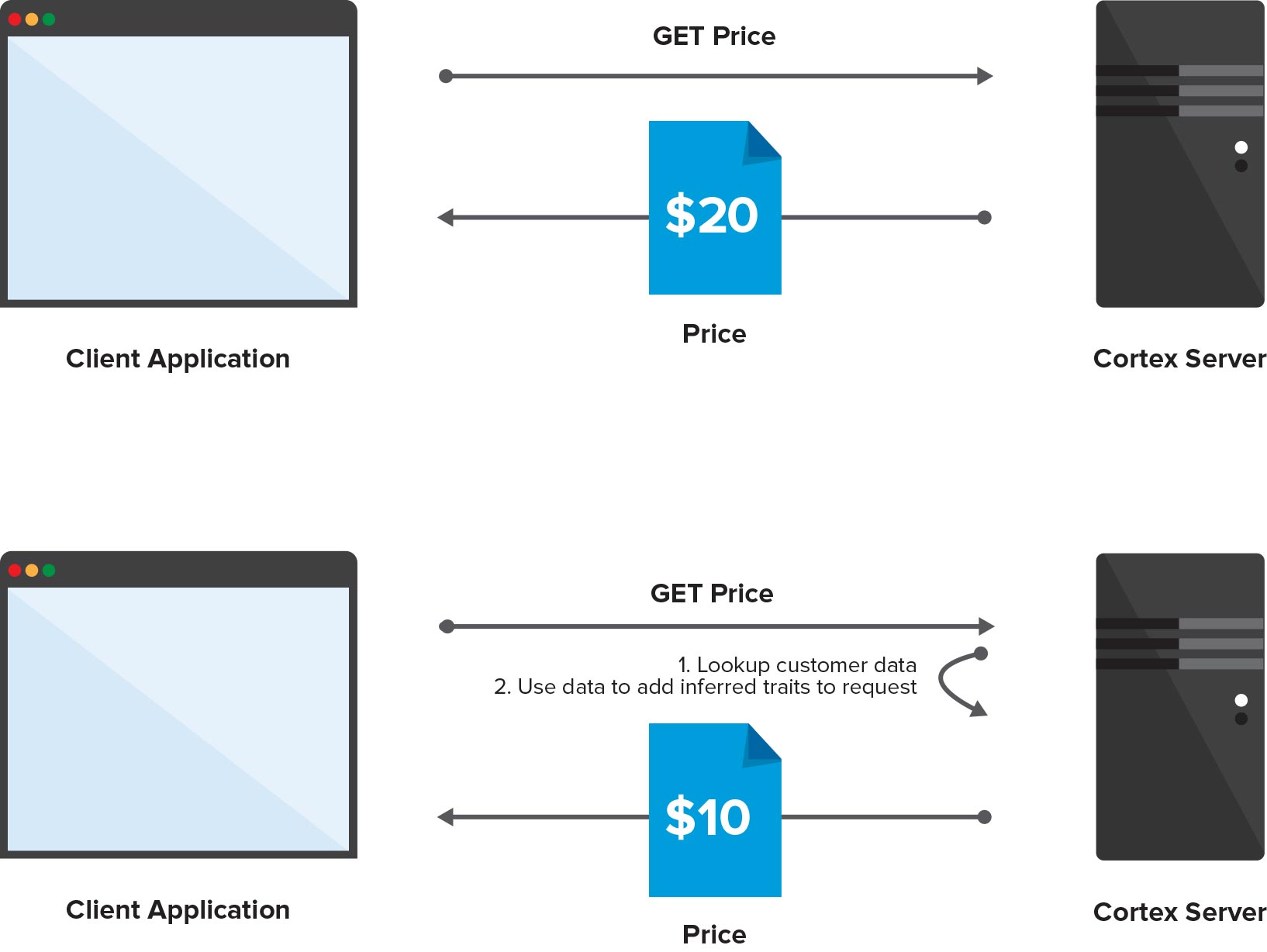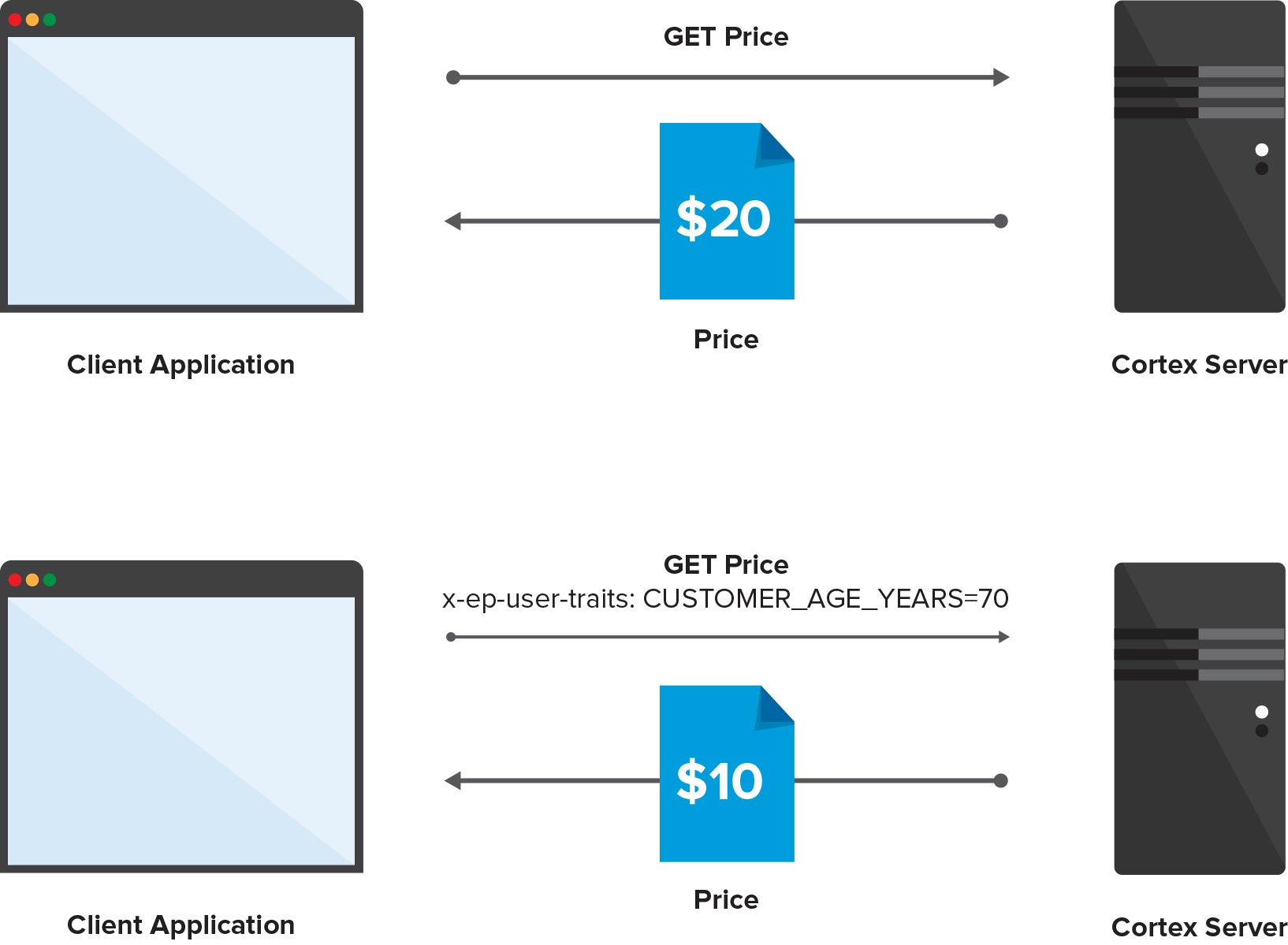Personalization
Personalization
Introduction
Personalization refers to offering different pricing, promotions or content based on the shopper's attributes, known as traits. For example, an item's price may only be discounted for shoppers who are over sixty five years old. Personalized pricing is also referred to as Dynamic Pricing or Differential Pricing.
How Personalization Works
Cortex supports personalization of prices and promotions. A shopper's traits are added to a Cortex request in two ways:
Automatically Inferred Traits
When a client application requests a price from Cortex, Cortex evaluates a set of pricing rules using traits inferred from data about the shopper and calculates a corresponding price. The list of traits automatically inferred from the Commerce Engine is shown in the Supported Traits section.
The following diagram summarizes how pricing is affected by shopper's traits inferred from Commerce Engine data:
The client application can also pass additional shopper traits to influence personalization of pricing, promotions and content. See Setting Traits for more information.
Setting Traits
Client applications can pass additional shopper traits to Cortex through the x-ep-user-traits HTTP header. Traits passed through this header override the traits inferred internally by Cortex.
The following diagram summarizes how pricing is affected when a client application passes in a shopper trait:
Using the x-ep-user-traits header is optional. However, if you choose to use the x-ep-user-traits header, you must set it on every request to keep pricing and promotions consistent. Cortex returns the default pricing for any request where the x-ep-user-traits header isn't set, even if the header was previously set in another request.
x-ep-user-traits: LOCALE=fr-FR, CURRENCY=EUR, GEOIP_COUNTRY_CODE=es ...Cortex also accepts multi-line HTTP headers:
x-ep-user-traits: LOCALE=fr x-ep-user-traits: CURRENCY=EUR x-ep-user-traits: ...
x-ep-user-traits: "TARGET_URL=http://example.com", GEOIP_COUNTRY_CODE=es
Supported Traits
| Trait Key | Type | Set Internally | Description |
|---|---|---|---|
| LOCALE | String | Yes | The shopper's preferred Locale, declared as an IETF RFC 5646 Language Tag. If the store does not support this Locale, then the store default is used. Cortex does not set this trait by default. |
| CURRENCY | String | Yes | The shopper's preferred Currency, declared as an ISO 4217 Currency Code. If the store does not support this Currency, then the store default is used. Cortex does not set this trait by default. |
| SEARCH_TERMS | String | No | A list of terms the shopper used in a search engine to find the e-commerce site. This term must be separated by a ";" semi-colon. Cortex does not set this trait by default. |
| CUSTOMER_AGE_YEARS | Integer | Yes | The shopper's age in years. Cortex sets this trait by inspecting the shopper's profile and calculating the shopper's age from the shopper's date of birth. |
| CUSTOMER_GENDER | String | Yes | The shopper's gender. Cortex sets this by inspecting the shopper's profile. Valid values are: F, M. |
| CUSTOMER_SEGMENT | String | Yes | A list of segments that a shopper belongs to. Multiple segments must be separated by a ";" semi-colon. Cortex sets this trait by inspecting the shopper's assigned segments. |
| REGISTERED_CUSTOMER | Boolean | Yes | A flag indicating whether the shopper has registered an account. Cortex sets this trait by inspecting the shopper's profile. |
| INSTORE_SEARCH_TERMS | String | No | A list of terms the shopper used during in-store searches. Terms must be separated by a ";" semi-colon. Cortex does not set this trait by default. |
| TARGET_URL | String | No | The e-commerce site's landing page URL. Be sure to wrap the key/value pair in quotes.Cortex does not set this trait by default. |
| REFERRING_URL | String | No | The referring site's URL. Be sure to wrap the key/value pair in quotes.Cortex does not set this trait by default. |
| FIRST_TIME_BUYER | Boolean | Yes | A flag indicating whether the customer previously made a purchase at this store. Cortex sets this trait by inspecting the shopper's profile. |
| CATEGORIES_VISITED | String | No | A list of categories the shopper has browsed. Terms must be separated by a ";" semi-colon. Cortex does not set this trait by default. |
| GEOIP_CONTINENT | String | No | The GeoIP continent. |
| GEOIP_GMT_TIME_ZONE | String | No | The GeoIP time zone. |
| GEOIP_FIRST_LEVEL_DOMAIN | String | No | The GeoIP first level domain. |
| GEOIP_SECOND_LEVEL_DOMAIN | String | No | The GeoIP second level domain. |
| GEOIP_ZIP_OR_POST_CODE | String | No | The GeoIP zip or postal code. |
| GEOIP_ROUTING_TYPE | String | No | The GeoIP routing type. |
| GEOIP_STATE_OR_PROVINCE | String | No | The GeoIP state or province. |
| GEOIP_CITY | String | No | The GeoIP city. |
| GEOIP_CONNECTION_TYPE | String | No | The GeoIP connection type. |
| GEOIP_COUNTRY_CODE | String | No | The GeoIP country code. |



